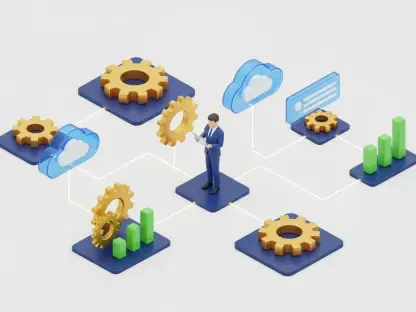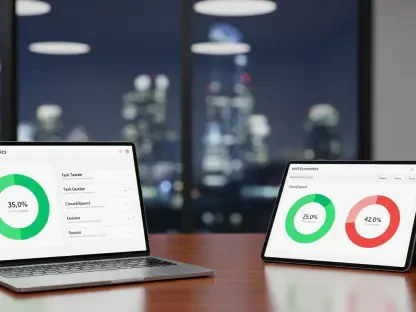In the sprawling landscape of Indian logistics, where diverse terrains, unpredictable traffic, and fluctuating fuel costs create a daily gauntlet for fleet owners, a technological revolution is quietly reshaping the industry. Fleet management, once bogged down by cumbersome paperwork and guesswork, is now being redefined by innovative solutions that prioritize precision and efficiency. At the heart of this transformation is a platform that has spent over a decade honing its expertise, delivering tools that empower logistics operators to navigate challenges with confidence. This shift from manual processes to data-driven systems offers a glimpse into how technology can turn operational hurdles into opportunities for growth, particularly in a market as dynamic and demanding as India’s.
Revolutionizing Logistics Operations
Harnessing Cutting-Edge Tools for Efficiency
The logistics sector in India often grapples with inefficiencies stemming from outdated tracking methods and delayed decision-making, but advanced technology is paving the way for significant improvements. Real-time GPS tracking stands out as a game-changer, allowing fleet managers to monitor vehicle locations with pinpoint accuracy. This capability not only curbs misuse but also optimizes route planning, a critical factor in urban areas where congestion can derail schedules. Additionally, telematics integration provides a deeper understanding of vehicle performance, ensuring that every journey is as efficient as possible. By replacing guesswork with actionable data, such innovations help reduce idle time and fuel waste, directly impacting the bottom line for fleet operators across the country who face relentless pressure to maintain profitability in a competitive market.
Data-Driven Decision Making
Beyond tracking, the power of data analytics is transforming how fleet managers approach their operations in the Indian context. Detailed insights into fuel consumption, driver behavior, and maintenance schedules enable proactive strategies that cut costs and extend vehicle lifespan. For instance, identifying patterns of excessive idling or harsh braking allows for targeted driver training, fostering safer and more economical practices on the road. These analytics also help predict maintenance needs before breakdowns occur, minimizing downtime in an industry where every minute counts. In a market characterized by razor-thin margins, the ability to make informed decisions based on real-time data rather than intuition offers a competitive edge, ensuring that logistics businesses can adapt swiftly to challenges like rising operational expenses or unexpected delays.
Addressing Unique Challenges in India
Simplifying Regulatory Compliance
Navigating the complex web of transport regulations in India poses a significant challenge for fleet operators, often leading to costly penalties and operational setbacks. Technology now offers a streamlined approach to compliance through automated systems like electronic logging devices (ELDs) that ensure accurate tracking of driver hours. This automation eliminates the risk of human error in record-keeping and simplifies reporting processes, providing peace of mind to businesses under constant regulatory scrutiny. By embedding compliance features into daily operations, fleet managers can focus on core activities rather than paperwork, knowing that their adherence to legal standards is supported by reliable digital tools. Such advancements are particularly vital in a country where regulations can vary widely across states, making consistency a persistent struggle for many.
Scalability for Diverse Fleet Sizes
The diversity of fleet operations in India, ranging from small businesses with a handful of vehicles to large enterprises managing hundreds, demands flexible solutions that can grow with the company. Modular technology platforms address this need by offering customizable features tailored to specific operational scales. A small operator might focus on basic tracking and fuel monitoring, while a larger firm could integrate advanced analytics and predictive maintenance tools. This adaptability ensures that businesses of all sizes can access cutting-edge solutions without overextending their budgets. Furthermore, as companies expand, these scalable systems provide a seamless transition, preventing the need for costly overhauls. In a rapidly evolving market, the ability to scale technology alongside business growth is a crucial factor in maintaining efficiency and competitiveness over the long term.
Looking Ahead to Future Innovations
Investing in Predictive Analytics
As the logistics industry continues to evolve, the integration of artificial intelligence (AI) is poised to redefine fleet management with predictive analytics. These advanced tools analyze historical data to forecast maintenance needs and potential failures before they occur, drastically reducing the risk of unexpected downtime. For Indian fleet operators, where vehicle reliability is often tested by challenging road conditions, such foresight can save significant costs and prevent delays. The ability to anticipate issues rather than react to them marks a shift toward proactive management, ensuring smoother operations even in high-pressure environments. This focus on AI-driven solutions reflects a broader commitment to staying ahead of industry trends, positioning technology as a cornerstone for future-ready logistics strategies.
Promoting Sustainable Practices
Sustainability has emerged as a critical concern in logistics, and technology is playing a pivotal role in driving eco-friendly practices within the Indian market. Optimizing fuel efficiency through data analytics not only reduces costs but also minimizes environmental impact, aligning with global pushes for greener operations. Route optimization tools further contribute by cutting unnecessary mileage, while insights into driver behavior encourage habits that conserve energy. These efforts resonate deeply in a country where environmental regulations are tightening and public awareness of sustainability is growing. By embedding such practices into fleet management systems, technology providers are helping operators meet both economic and ecological goals, ensuring that profitability and responsibility go hand in hand as the industry looks to a more sustainable future.
Reflecting on a Decade of Impact
Looking back, the journey of transforming Indian fleet management through technology reveals a remarkable shift from manual inefficiencies to streamlined, data-driven operations. The adoption of tools like GPS tracking and ELDs tackled longstanding issues of resource waste and regulatory burdens, while scalable platforms ensured accessibility for businesses of all sizes. As the industry adapted to these innovations, the emphasis on sustainability and predictive analytics through AI underscored a forward-thinking approach. For fleet operators who embraced these changes, the benefits of cost savings and operational control became undeniable. Moving forward, the focus should remain on leveraging emerging technologies to address evolving challenges, ensuring that logistics in India continues to thrive through adaptability and innovation.









